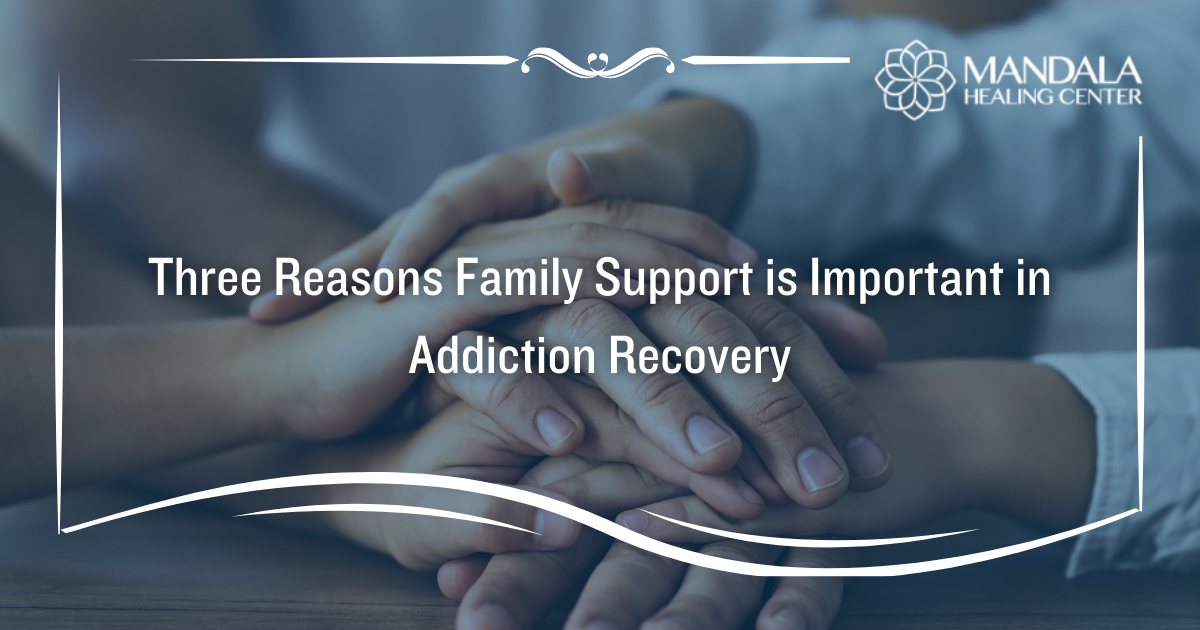Addiction can be hard on your body, mind, and spirit. The effects of untreated addiction can be felt in physical symptoms and long-term health problems. They show up in developing or worsening mental health symptoms. People lose self-esteem and self-worth and their important relationships can suffer.
Recovery from addiction requires a lot of dedication and commitment. People struggling with addiction and in recovery need a lot of support throughout their time in treatment and for the rest of their lives.
Support during addiction recovery comes in many forms: medical and mental health professionals, treatment programs, support networks, alumni groups, and others. One of the most important sources of support comes from the person’s family. For some, family support in recovery can be the difference between lifelong sobriety and ongoing struggles with relapse and addiction.
If you have a family member who lives with substance abuse or addiction, or you need support during your addiction recovery journey, you are not alone. Reach out to the Mandala Healing Center for more information about our comprehensive treatment programs and ongoing support for the entire family.
Here are three reasons why family support is important in addiction recovery.
1. Family Support Makes It Easier to Get Treatment
Addiction affects all aspects of a person’s life, including their loved ones and communities. It is no wonder that these same loved ones and community members can be the most powerful sources of support.
The very first step of getting addiction treatment is recognizing that there is a problem. Friends and family members are often affected by their loved one’s addiction–and family members are best able to bring awareness to it.
With the help of their family members, people are more likely to realize they need treatment and get the practical and emotional support they need to start and complete treatment.
The process of finding high-quality treatment, working with employers and insurance companies, and arranging for travel can be overwhelming for people who struggle with addiction. Having family members who can step in and take on some of these challenges makes it possible–and more likely–for them to get started in treatment.[1]
2. Family Support Reduces the Risk of Relapse in Recovery
The difference between lifelong sobriety and relapse is often the amount of support a person has once they complete rehab. Addiction is never cured. People must instead find ways to stay engaged and active in their recovery. It can be difficult to maintain this high level of commitment to recovery, and people who lose steam or face challenges may relapse.
Like many things in life, the challenge of lifelong recovery is made easier with the practical and emotional support of family members.
Some examples of practical aftercare support include:
- Helping their loved one schedule appointments
- Offering child or pet care during treatment
- Reminding them about meetings and appointments
- Working with the insurance company or treatment facility to manage payments
- Lending money for treatment
- Giving rides to and from appointments or treatment activities
Family members can also be an unmatched source of emotional support after treatment ends. Family members might:
- Remind them of their reason for being in treatment
- Offer a non-judgmental place to share
- Learn about addiction and treatment to deepen their understanding
- Reaffirm their love and care
- Help their loved one focus on the future and forgive the past
Having family support makes it more likely that a person in recovery will get the help they need to form a good aftercare plan. It is also more likely that they will stick with the plan and be able to adapt it as time goes on. Research has shown that individuals who have the support and involvement of their family in treatment and recovery are less likely to relapse than those who do not have the same level of support.[2]
3. Family Support Leads to Lifelong Healing
Addiction is a family disease. When one member of a family lives with addiction, everyone else is affected, even if it is not easy to understand in the midst of it.
One important aspect of family support during addiction recovery is working to identify and heal the places where the family isn’t functioning well. When the entire family goes through counseling or treatment, they get the tools they need to manage stress, stop their enabling behaviors, and unlearn roles that make it hard to heal.
Family therapy is often included as part of a person’s addiction treatment plan. It is also important for individual family members to have their own support, either through support groups like Al-Anon, or counseling.
When the whole family gets the support and education they need, there are better outcomes, reduced family stress, and less chance of relapse.
Find Family-Focused Addiction Recovery Services Today
If you or someone you love lives with substance abuse or addiction, please reach out to the staff at the Mandala Healing Center for information about the programs we offer. Whether you are taking your first step toward treatment or have been in recovery for some time, we would be honored to join you on your journey.
Addiction can feel lonely, but you are not alone. Call today to learn how we can support you and your family.
References:












